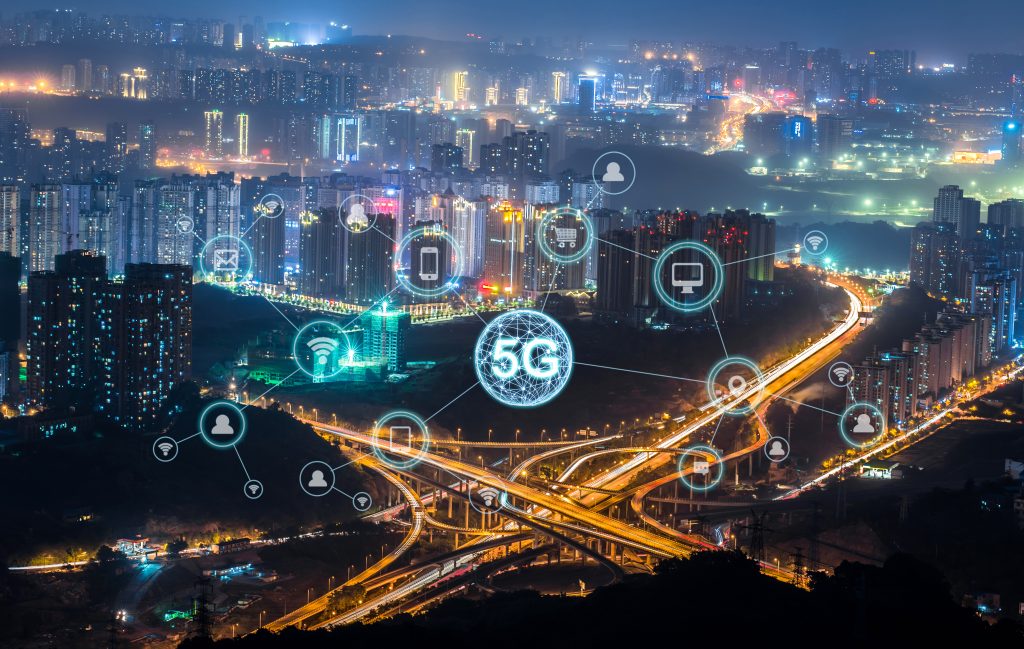Did you know that integrating 5G using mmWave spectrum could potentially boost global productivity by 1.7% of global GDP in 2030, equivalent to 10% of global GDP growth? The economic impact of 5G technology is expected to be significant, and it’s not just hype. From transforming industries to driving innovation, 5G has the potential to reshape the global economy in ways we can only begin to imagine. In this discussion, we will explore the various ways in which 5G could impact the global economy, from its potential to accelerate the growth of the digital economy to its influence on industries like healthcare and entertainment. So, let’s dive in and uncover the opportunities and challenges that lie ahead as we navigate the 5G revolution.
Economic Potential of 5G-Enabled Technology
The economic potential of 5G-enabled technology is immense. According to a report commissioned by Qualcomm Incorporated and conducted by Oxford Economics, the integration of 5G using mmWave spectrum is projected to boost global productivity by 1.7% of global GDP in 2030, which is equivalent to 10% of global GDP growth in that year. This highlights the significant impact that 5G can have on the global economy.
One of the key areas where 5G can drive economic growth is through productivity gains. With its enhanced capabilities, such as faster speeds, lower latency, and greater traffic capacity, 5G can enable businesses to operate more efficiently and effectively. This can lead to increased productivity and ultimately contribute to economic growth.
Furthermore, 5G presents various investment opportunities. As businesses and industries embrace 5G technology, there will be a need for infrastructure development, equipment upgrades, and innovation in products and services. This opens up avenues for investment, creating new opportunities for businesses and investors.
In addition to economic growth, 5G can also promote social equity. By providing increased opportunities, such as expanded access to education and healthcare services, 5G can help bridge the digital divide and promote inclusivity.
Moreover, 5G enables remote work possibilities, allowing individuals to work from anywhere with reliable and fast connections. This can lead to increased flexibility, improved work-life balance, and reduced commuting, all of which can have positive impacts on productivity and quality of life.
Lastly, 5G has the potential to revolutionize other technologies like AI and IoT. The faster speeds and lower latency provided by 5G can enhance the capabilities of AI and IoT applications, enabling more advanced and efficient solutions across various industries.
Business Impact of 5G
With its potential to drive economic growth and innovation, the impact of 5G on businesses is significant and far-reaching. The investment in 5G technology by businesses is already paying off, as the majority of companies are experiencing improvements in the speed and accuracy of their operations. This is just the beginning, as 5G is expected to be a platform for future technologies like AI and IoT. In fact, two-thirds of executives surveyed said that 5G influenced their decision to adopt IoT or cloud. The competition without 5G is a concern for many businesses, with 70% of executives believing that they would fall behind their competitors without this technology. Additionally, 5G opens up new possibilities for remote work, allowing employees to work from anywhere with high-speed connectivity. Overall, 5G is not only enhancing the operational capabilities of businesses, but it is also driving innovation, improving productivity, and enabling new ways of working.
Other Benefits of 5G Technologies
Other benefits of 5G technologies include expanded access to education and healthcare services, increased remote work possibilities, and encouragement of investments in technologies like AI and IoT. Greater social equity can be achieved through the increased opportunities that 5G provides. With expanded access to education and healthcare services, individuals in remote or underserved areas can now have access to quality education and healthcare resources. This can help bridge the gap between different socioeconomic groups and promote equality of opportunity.
Furthermore, 5G enables increased remote work possibilities. With faster speeds, lower latency, and greater traffic capacity, individuals can work from anywhere, leading to greater work-life balance and flexibility. This can also open up job opportunities for individuals who may not have had access to traditional office jobs.
Investments in technologies like AI and IoT are also encouraged by 5G. The enhanced capabilities of 5G, such as real-time data transmission and processing, provide a solid foundation for the development and deployment of AI and IoT technologies. This can lead to advancements in various sectors, including healthcare, manufacturing, and transportation, and contribute to economic growth and job creation.
Expertise of Oxford Economics
Expanding on the discussion of the benefits of 5G technologies, it is important to highlight the expertise of Oxford Economics in providing quantitative economic analysis and original research to evaluate the potential economic impact of this innovative technology. Oxford Economics is a world leader in conducting economic impact analysis, utilizing forecasting models, and conducting extensive surveys to evaluate the potential effects of 5G on the global economy.
With their team of experts, including Anubhav Mohanty, Associate Director of Economic Consulting, and Matthew Reynolds, Senior Research Manager of Thought Leadership, Oxford Economics works with clients globally and across sectors to build models, forecast markets, and evaluate interventions. Their expertise allows them to provide valuable insights into the potential economic benefits and opportunities that 5G technologies can bring.
Through their quantitative research and original analysis, Oxford Economics helps businesses and policymakers understand the potential economic impact of 5G, enabling them to make informed decisions and strategic plans. Their expertise in economic forecasting and modeling allows them to provide accurate and reliable estimates of the economic benefits that can be derived from the widespread adoption of 5G.
Potential Economic Benefits of 5G
The potential economic benefits of 5G are vast, with projections indicating significant contributions to global GDP growth and job creation by 2035. The economic impact of 5G is expected to be substantial, with the following potential benefits:
- 5G job creation: The integration of 5G technology is projected to create 22 million jobs by 2035. This will provide new employment opportunities and stimulate economic growth.
- 5G GDP contribution: According to a study conducted by Qualcomm, 5G is projected to contribute $12.3 trillion to global GDP by 2035. This significant contribution will boost economic prosperity and enhance productivity.
- Healthcare benefits of 5G: The healthcare industry will experience transformative advancements with the implementation of 5G. Real-time remote monitoring of patients, quicker and more accurate diagnosis and treatment, and the development of new medical technologies are all made possible with 5G. These improvements will lead to better patient outcomes and lower healthcare costs.
- Transformation of smart utilities with 5G: 5G will revolutionize the management of smart utilities. It will enable monitoring, tracking, and automation, facilitating the shift towards renewable energy and the digitization of the grid. This transformation is estimated to contribute $330 billion to global GDP by 2030.
Accelerating the Growth of the Digital Economy
With the potential economic benefits of 5G already established, it is crucial to examine how this technology is accelerating the growth of the digital economy. One significant way 5G is driving this growth is through the development of new technologies and applications that were previously impossible. For example, 5G enables the deployment of autonomous vehicles, transforming the transportation industry and creating job opportunities for growth. Additionally, 5G provides real-time data transmission and processing capabilities, allowing for faster and more efficient communication. This opens up new possibilities for businesses to optimize their operations and serve their customers better.
The growth of the digital economy is further accelerated by the capabilities of 5G. As more industries and sectors adopt this technology, they are able to leverage its benefits to expand their reach, improve productivity, and drive innovation. This, in turn, creates new job opportunities and stimulates economic growth. With 5G’s ability to transmit data at higher speeds and with greater reliability, businesses can access and analyze real-time data more efficiently, leading to better decision-making and increased competitiveness in the digital marketplace.
Impact on the Healthcare Industry
The healthcare industry is set to experience significant transformation and advancements with the implementation of 5G technology. The integration of 5G into the healthcare sector will bring about numerous benefits and opportunities for growth. Here are some key ways in which 5G will impact the healthcare industry:
- Quicker diagnosis: With the high-speed connectivity of 5G, healthcare professionals will be able to access and analyze patient data in real-time, leading to faster and more accurate diagnosis.
- Remote monitoring: 5G will enable real-time remote monitoring of patients, allowing healthcare providers to track vital signs and health conditions from a distance. This will improve patient care, particularly for those with chronic diseases or who live in remote areas.
- Robotic surgery: The low latency and high reliability of 5G will facilitate the development and implementation of robotic surgery. Surgeons will be able to perform complex procedures with precision, even from a remote location.
- Lower healthcare costs: By enabling remote monitoring and telemedicine, 5G has the potential to reduce healthcare costs. Patients can receive care from the comfort of their homes, eliminating the need for unnecessary hospital visits and reducing the burden on healthcare systems.
- New medical technologies: 5G will drive the development of innovative medical technologies, such as virtual reality (VR) and augmented reality (AR) applications for medical training and education. These advancements will revolutionize healthcare practices and improve patient outcomes.
Impact on the Entertainment Industry
5G technology is poised to revolutionize the entertainment industry, opening up new opportunities for content delivery and transforming the way audiences consume media. With its faster speeds, lower latency, and greater traffic capacity, 5G enables high-quality video and audio content delivery in real-time. Streaming services can provide content without buffering or lag, enhancing the user experience and allowing for seamless entertainment consumption. As a result, new streaming platforms are expected to emerge, catering to the demands of 5G-enabled audiences.
The impact of 5G on the entertainment industry goes beyond improved content delivery. It also creates job opportunities as the industry adapts to technological advancements. With the development of new streaming services and platforms, there will be a need for content creators, producers, and technicians who can harness the capabilities of 5G technology. This will contribute to the growth of the industry and provide employment prospects for individuals with the relevant skills and expertise.
Furthermore, real-time content delivery made possible by 5G will enhance the user experience by eliminating delays and allowing for interactive and immersive entertainment experiences. Whether it’s live streaming events, multiplayer gaming, or virtual reality content, 5G opens up a whole new world of possibilities for both creators and consumers in the entertainment industry. Overall, 5G technology is set to transform the entertainment landscape, creating new avenues for content delivery, job opportunities, and an enhanced user experience.



